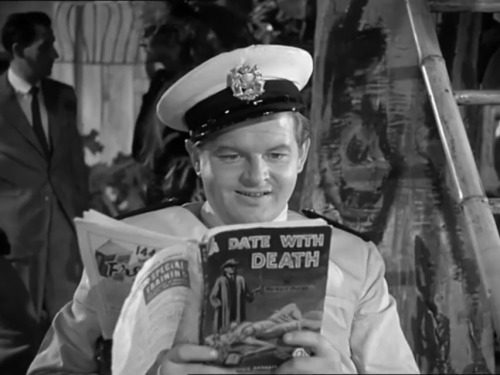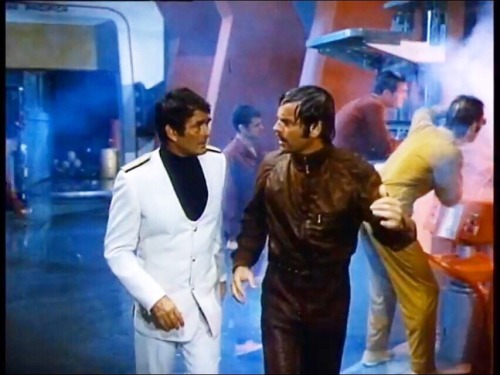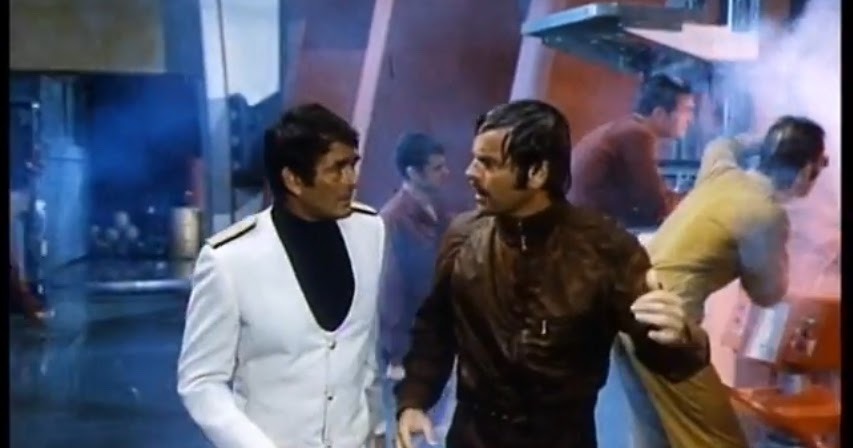
Slob with a blog. Vicariously join me on my movie viewing adventures! Visit my blog here: http://jinglebonesmovietime.blogspot.com
297 posts
Movie Number 68: Who Done It? (Basil Deardon, 1956).

Movie number 68: Who Done It? (Basil Deardon, 1956).
Who Done It? is a late period Ealing comedy starring popular TV comic Benny Hill, directed and written by Ealing stalwarts Basil Deardon and TEB 'Tibby' Clarke, respectively.
Hill stars as Hugo Dill, a disillusioned ice show sweeper with an obsession for pulp detective fiction. After winning £100 in a detective magazine competition Dill sets himself up as a private investigator. He duly becomes entangled with political saboteurs whom he unwittingly aides in an assassination attempt. Meanwhile becoming romantically involved with aspiring showgirl and strongwoman Belinda Lee.
Yes, the plot is ridiculous. But, more importantly, it is funny. It is certainly slapstick of the broadest kind, but those expecting Hill's brand of saucy (some would argue sexist) seaside postcard humour will be disappointed; this is purely innocent stuff and the better for it. Even the burgeoning romance between Hill and Lee is a rather chaste affair.
Basil Dearden was one of the most prolific Ealing directors, although perhaps not the obvious choice for Who Done It? Helmer of the acclaimed dramas The Captive Heart (1946) and The Blue Lamp (1950), he rarely turned his hand to comedy and one would assume it was not his forte but for the excellent League of Gentleman (1960), produced by Ealing head Michael Balcon a year after the studio's demise. 'Tibby' Clarke on the other hand had proved himself an excellent comedy writer as scenarist of the bone fide Ealing classics Hue and Cry (Charles Crichton, 1947) Passport to Pimlico (Henry Cornelius, 1949) and The Lavender Hill Mob (Charles Crichton, 1951). Who Done It? doesn't rank among Clarke's best work but is nonetheless highly acceptable second tier work from a screenwriter who rarely wrote a bad script.
Who Done It? in no way represents the best of the Ealing Studios, yet neither is it the failure that its relative obscurity would suggest. It is well worth seeking out, especially for fans of vintage British cinema. Read an unedited version of this review and reviews of other classic Ealing Studios films on my new blog jinglebonesmovietime.blogspot.com
-
 goatilocks13 liked this · 1 year ago
goatilocks13 liked this · 1 year ago -
 terminusverge liked this · 2 years ago
terminusverge liked this · 2 years ago -
 ianirons liked this · 3 years ago
ianirons liked this · 3 years ago -
 callmikep liked this · 4 years ago
callmikep liked this · 4 years ago -
 moved2letzgetsilly liked this · 6 years ago
moved2letzgetsilly liked this · 6 years ago
More Posts from Jingle-bones

Movie number 67: City Beneath the Sea (Irwin Allen, 1971)
Originally made for US TV, City Beneath the Sea is an underwater sci-fi adventure from producer/director Irwin Allen, initially pitched as a weekly TV series in 1969. At first unsuccessful, Irwin was able to secure support for a TV movie based upon the idea and City Beneath the Sea duly premiered on the NBC network in January 1971, fulfilling its duel purpose as both a 'Movie of the Week' and as a pilot for a proposed series.
Set in the year 2053, City Beneath the Sea stars Stuart Whitman as commander of underwater city Pacifica. As storage for both the US gold reserve and the valuable yet highly unstable explosive H128, Pacifica is the target of an inside robbery from certain unsavory officials. However, this problem pales in significance to the imminent threat posed by an asteroid (or rather 'planetoid') on a direct collision course with the sub-aquatic metropolis!
A fairly impressive cast was assembled for the movie; joining the likeable, square-jawed Whitman are TV regulars Robert Wagner and Richard Basehart. A little extra cachet is added by blink-and-you-miss-them cameos from Joseph Cotton and boxer Sugar Ray Robinson. Of course it betrays its TV origins; the effects, largely utilising model work, are obvious but appealingly and in no way detract from ones enjoyment of the film. The colourful set design and costumes exhibit a nice 1970's futurist chic. Where the movie fails is in its narrative. The premise, while inherently silly, is a fairly strong one. But the screenplay, by John Meredyth Lucas, suffers from too much exposition and too little action. This, perhaps more than anything, sealed the fate of the property as NBC did not commission any further episodes. It did, however, secure release in UK cinemas retitled One Hour to Doomsday.
Over time City Beneath the Sea has attained a significant and deserved cult following and remains an entertaining kitsch treat, especially for fans of vintage TV sci-fi and of the Allen oeuvre in particular.
Visit my blog JINGLE BONES MOVIE TIME to read a longer, more in-depth review of CITY BENEATH THE SEA! Link below.


DUMBO (Dir: Tim Burton, 2019).
Being of the opinion that Walt Disney’s Dumbo (Ben Sharpsteen, 1941) is one of the greatest movies ever made, I was not entirely thrilled at the prospect of a remake, in spite of my admiration for director Tim Burton. But, ever the open-minded film enthusiast, I watched it anyways!
Dumbo is, of course, the story of the circus elephant born with oversized ears who silences his naysayers when his ears provide him with the ability of flight.
The first half of Burton’s movie roughly follows the original, while the second half continues Dumbo’s story after the events of the first movie, chronicling his tenure as the star attraction of an early amusement park and a daring rescue attempt of his imprisoned mother.
Predictably it is the first half which suffers most in comparison with the original. While the original movie runs little more than an hour, its basic story is retold here in about 40 minutes. The result of which is the narrative beats all fall a little off the mark. For example, Dumbo’s ability to fly is established within the first 20 minutes of the movie, rather than at the climax. The introduction of an antagonist who is swiftly dispensed with roughly halfway through is also slightly jarring.
Absent are the crows and Timothy Mouse, replaced by elephant wrangler Colin Farrell and his children Nico Parker and Finley Hobbins. The relationship between Dumbo and his only friend Timothy is sorely missed and as a result the emotional core of the movie seems sadly lacking. The tragic-comic original contains both moments of great joy and great sadness, while this Dumbo is content to coast along without reaching such emotional depths.
That said, being a Burton production it looks fabulous and has an appealing cast including a neat turn from Danny DeVito as the circus ringmaster. The Climactic rescue attempt does have some genuine moments of excitement.
By all means watch and enjoy Tim Burton’s Dumbo, especially it’s superior second half. Just don’t expect it to soar to the same thrilling heights as Walt Disney’s masterful original.
Read a longer, more in-depth version of this review on my blog: jinglebonesmovietime.blogspot.com

ATLANTIS: THE LOST CONTINENT (George Pal, 1961).
Special effects maestro turned director George Pal followed his acclaimed adaptation of H G Wells' The Time Machine (1960) with the mythical fable Atlantis: The Lost Continent.
Out sailing with his father, Greek fisherman Demetrios (Anthony Hall) rescues the shipwrecked Atlantean Princess Antilla (Joyce Taylor). On returning the Princess to the mythical kingdom, Demetrios is imprisoned and forced into slave labour. It turns out the technologically superior Atlantiaeans are a sadistic lot, inflicting punishments on their captives such as turning them into man-beast hybrids. Demetrios rebels, attempting to win the affection of the princess in the process. He then must free the other slaves and exit Atlantis before its inevitable demise.
After the excellent Time Machine, Atlantis: The Lost Continent was seen as something of a disappointment. Actually, the movie is a fun and pretty wild ride but lacks the gravitas of earlier Pal classics such as The War of the Worlds (Byron Haskin, 1953) tom thumb (Pal, 1958) and, as mentioned, The Time Machine.
It features some impressive visual effects, most notably during the empire’s spectacular fall which serves as the movie’s climax. The cast is made up of faces largely unfamiliar to modern audiences, save for maybe John Dall as baddie Zaren and Edward Platt as the sympathetic High Priest Azar. While the performers do a proficient enough job they do get a little lost among the spectacle.
With influences of Jules Verne-esq sci-fi and the then popular sword and sandal movies, Atlantis: The Lost Continent has a somewhat uneasy footing in both genres. As a special effects laden sci-fi adventure it pales in comparison to superior epics Journey to the Center of the Earth (Henry Levin, 1959) and Jason and the Argonauts (Don Chaffey, 1963).
Yet, I have a lot of affection for the movie. If you are fan of George Pal you will definitely enjoy this. Ultimately it is little more than matinee fluff, but it’s matinee fluff on a grand scale.
Read an unedited version of this review on my blog JINGLE BONES MOVIE TIME! Link below.

My apologies for the hiatus in posting new reviews. I hope to be back on track tomorrow with brand new content! In the meantime check out all of my previous reviews in my new blog: JINGLE BONES MOVIE TIME! Link below.

POKÉMON: DETECTIVE PIKACHU (Dir: Rob Letterman, 2019).
Part of the phenomenally successful Pokémon franchise, Detective Pikachu is the first movie in the series to combine live-action with CGI Pokémon. The somewhat convoluted plot finds insurance salesman and former Pokémon trainer wannabe Tim Goodman (Justice Smith) teaming up with Pikachu (voiced by Ryan Reynolds) to investigating the mysterious death of Tim’s detective father. Tim is the only human who can understand the amnesia suffering Pikachu who has some previous link with the detective.
Visually Detective Pikachu is a highly satisfying film, narratively it is less so. The CGI Pokémon are beautifully realised creatures that integrate believably with the humans and real life surrounds; thankfully there are a wealth of these fabulous beings on display. Main man Pikachu has the requisite level of cuteness while Mr Mime makes a very effective and amusing cameo as a police informant; an encounter with oversized Torterra is visually stunning, as is the climatic battle with it Avengers-level of structural decimation! The film noir-like cityscapes that form the story’s backdrop are also highly impressive.
Where the movie falters is in its narrative which somehow manages to be both predictable and confusing. With a tidier and tighter script Detective Pikachu might have been a modern day Who Framed Roger Rabbit (Robert Zemeckis, 1988); a family friendly infusion of 40’s film noir detective thriller and 2019 high-tech blockbuster. Dedicated Pokémon fans will probably be more forgiving of Detective Pikachu’s short comings. For casual fans and those less familiar with the franchise, it should prove to be a bewildering yet entertaining 105 minutes. For its amazing eye candy alone Pokémon: Detective Pikachu is well worth catching.
Visit my blog JINGLE BONES MOVIE TIME for more movie reviews! Link below.